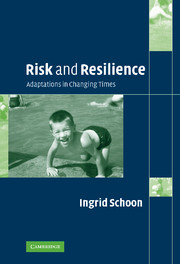Book contents
- Frontmatter
- Contents
- List of figures
- List of tables
- Foreword by Glen H. Elder, Jr
- Preface by John Bynner
- Acknowledgements
- Introduction
- 1 Risk and resilience: definitions
- 2 Towards a developmental-contextual systems model of adjustment
- 3 Persisting inequalities in times of social change
- 4 Selection, causation and cumulative risk effects
- 5 Protective factors and processes
- 6 Stability of early adjustment over time
- 7 Personal goals and life plans
- 8 Conclusions and outlook
- 9 Implications of findings for interventions and social policy
- Appendix A Two British birth cohorts
- Appendix B Response rates and handling of missing data
- Appendix C Description of variables used in the study
- References
- Index
2 - Towards a developmental-contextual systems model of adjustment
Published online by Cambridge University Press: 22 September 2009
- Frontmatter
- Contents
- List of figures
- List of tables
- Foreword by Glen H. Elder, Jr
- Preface by John Bynner
- Acknowledgements
- Introduction
- 1 Risk and resilience: definitions
- 2 Towards a developmental-contextual systems model of adjustment
- 3 Persisting inequalities in times of social change
- 4 Selection, causation and cumulative risk effects
- 5 Protective factors and processes
- 6 Stability of early adjustment over time
- 7 Personal goals and life plans
- 8 Conclusions and outlook
- 9 Implications of findings for interventions and social policy
- Appendix A Two British birth cohorts
- Appendix B Response rates and handling of missing data
- Appendix C Description of variables used in the study
- References
- Index
Summary
The ecology of human development involves the scientific study of the progressive, mutual accommodation between an active, growing human being and the changing properties of the immediate settings in which the developing person lives, as this process is affected by relations between these settings, and by the larger contexts in which the settings are embedded.
(Urie Bronfenbrenner, 1979, p. 21)This chapter presents a developmental-contextual systems model of adaptation across the life course. The model aims to integrate findings of previous research regarding factors and processes implicated in positive adjustment of individuals facing socio-economic deprivation into a guiding framework for research. The basic proposition underlying the approach is that human development takes place in a socio-historical context. It is argued that for a better understanding of the processes leading to positive adaptation despite the experience of adversity it is necessary to identify the interplay between individual and environment over time. Existing theoretical propositions for the study of resilience will be reviewed and integrated into a developmental-contextual systems model for the empirical study of adaptations in context and time.
The adopted person-process-context-time perspective is informed by assumptions formulated within the ecological theory of human development with its emphasis on multiple interacting spheres of influence (Bronfenbrenner, 1989; Bronfenbrenner, 1995; Bronfenbrenner & Ceci, 1994), as well as life-course theory with its focus on the temporal dimension and developmental effects of social change and transitions (Elder, 1998).
- Type
- Chapter
- Information
- Risk and ResilienceAdaptations in Changing Times, pp. 18 - 36Publisher: Cambridge University PressPrint publication year: 2006



